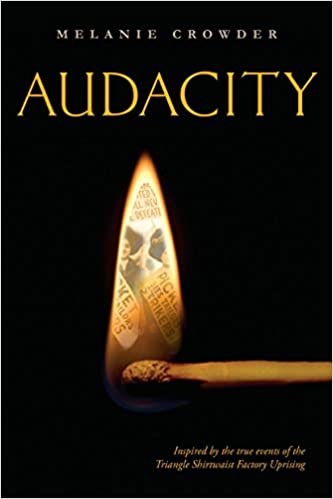Audacity – by Melanie Crowder
Philomel Books, 2015

This is a novel in verse about the life of pioneering labor activist Clara Lemlich (1886-1982). She may not be a household name, unless you grew up in a household imbued with pride in the leaders, many of them Jewish, of the struggle for workers’ rights in turn-of-the-twentieth century America. In that case, she was there in the pantheon along with Sydney Hillman, Rose Schneiderman, David Dubinsky, and so many others. Readers of Audacity will learn about the deplorable working conditions in sweatshops and the indifference of many Americans to the conditions under which their clothing was made. The will also come to understand the seemingly ineradicable sexism which women labor leaders like Lemlich had to confront, not only in the workplace, but in male-dominated unions and even their own families. Each chapter in the book is a monologue in verse chronicling Lemlich’s emotional and political progress from victimhood to fierce determination. Powerful and poignant metaphors, along with rhythmic language and insightful reflections into her own motivations, bring Clara Lemlich and her cause to life.
Lemlich’s story begins when she is a child living in Ukraine, then part of the Russian empire. (The story was previously told in a picture book.) She and her family experiences violent antisemitism, and eventually decide to emigrate. Clara describes the constant anxiety, even hopelessness, of their lives. She also paints a picture of herself as a strong and intellectual girl trapped within a family and culture that denies girls and women the right to study or to pursue careers. Melanie Crowder does not idealize Eastern European Jewish culture, which shared the patriarchal structure of the other communities. (She does not, however, imply that the Lemlich family is representative of all Jewish families.) While this part of the book was moving, I found some of the poems to lack strong metaphors or rhythm, reading more like journal entries than fully realized poems. (“How can I ever be more/than just someone’s daughter/wife/mother?”)
When the Lemlichs emigrate, first to England and later to New York City, the poems become more polished and Clara’s conflicts more vivid. Working in an unregulated garment factory, or “sweatshop,” Clara’s life is a prison: physically, emotionally, and financially. Desperate young women, mostly Jewish and Italian, produce pieces of garments to make shirtwaists, a women’s blouse popular at the time. The words of the poems echo Clara’s frustration and anger and capture the sheer repetitive torment of the workers’ daily lives:
Locked inside
a brick box
bile rises
lungs pumpworkers shuffle
to their stations.
Stools creak
heads bowneedles stabbing
bobbins banging
thread marching instraight
steady
seams.
Clara attends night school and struggles between pursuing her dream of a career in medicine and choosing to dedicate herself completely to a struggle to free herself and her fellow women workers from exploitation. The answer becomes clear to her: joining a union and enlisting others to join is the only answer. The double nature of women’s oppression, by ruthless bosses and also by male union leaders who denigrate their ability and their right to participate, only reinforces her convictions:
From the drapers’ table
I hear a new word
whispered
with a hard edge
furtive eyes
darting to the foreman’s deskunion
I think this is a word
I need to understand.
Fortunately, when she meets Joe, a printer and fellow labor activist, she begins to see male role models who, unlike her father, respect women and see them as partners in every sense. Crowder presents this relationship with subtlety, as an enriching part of Clara’s life, but not the only focus of her existence.
Economic exploitation is the sweatshop’s core model. Rather than merely alluding to suffering, Crowder makes immoral principles central to the book, and the workers’ response to them through collective action the only possible solution.
The links in the chain
that connectthe consumer looking
to purchase a clean white shirtwaist
demanding
a lower price fromthe clerk in the storefront looking
to move his family to a better part of town
demanding
a lower price fromthe owner of the garment shop looking
to put food on the table
demanding
a lower price fromthe cotton farmer.
The chain of words mimics the chain of complicity in creating inhuman working conditions.
Clara Lemlich suffered, struggled, and stood up for her beliefs. She did not work along, and knew that without convincing others that their cause was legitimate and their drive to organize a realistic goal, nothing would have changed. Even repeated acts of violence and time in jail did not dissuade her. Yet Audacity is not a didactic book, but a compelling novel in verse telling one woman’s life story and the story of her moment in history. At the end of the novel, the author provides a glossary of terms divided into useful categories. (Many readers surely don’t know the difference between a draper and a presser in the garment industry.) There is also a detailed section of historical background and an interview with members of Clara Lemlich’s family. The author has really done her homework, and her book reflects a commitment to thorough and meticulous research.

One thought on “An Unforgettable Woman”